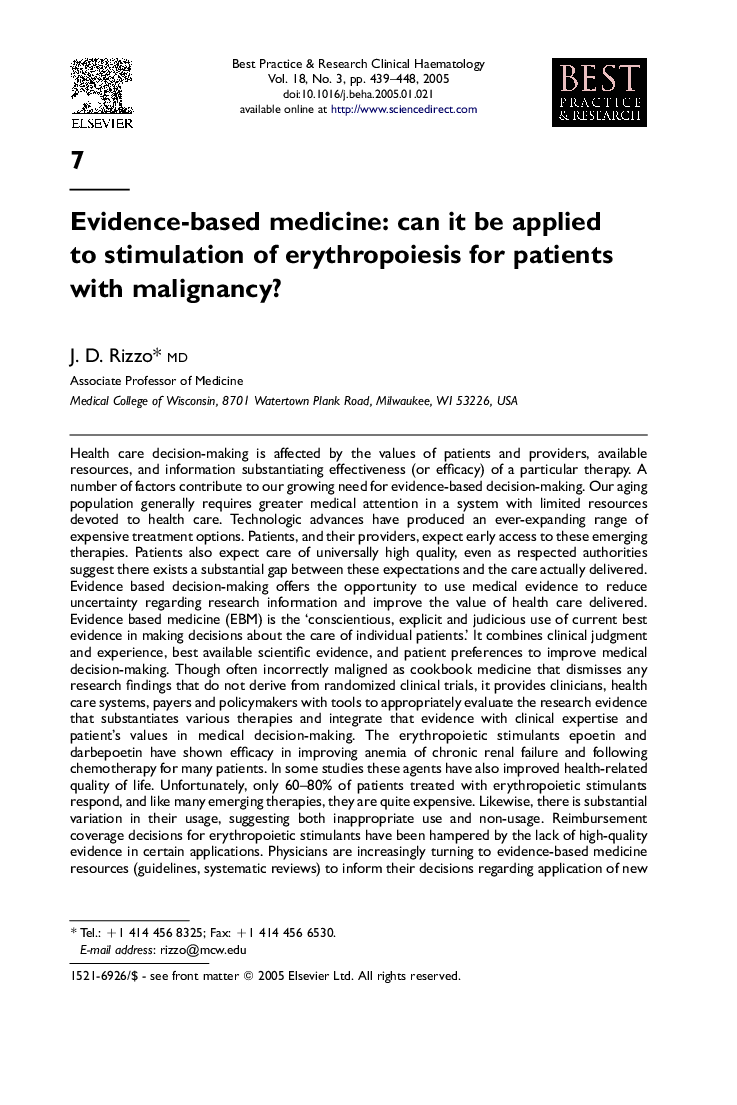| کد مقاله | کد نشریه | سال انتشار | مقاله انگلیسی | نسخه تمام متن |
|---|---|---|---|---|
| 10895479 | 1083068 | 2005 | 10 صفحه PDF | دانلود رایگان |
عنوان انگلیسی مقاله ISI
Evidence-based medicine: can it be applied to stimulation of erythropoiesis for patients with malignancy?
دانلود مقاله + سفارش ترجمه
دانلود مقاله ISI انگلیسی
رایگان برای ایرانیان
کلمات کلیدی
موضوعات مرتبط
علوم زیستی و بیوفناوری
بیوشیمی، ژنتیک و زیست شناسی مولکولی
تحقیقات سرطان
پیش نمایش صفحه اول مقاله

چکیده انگلیسی
Health care decision-making is affected by the values of patients and providers, available resources, and information substantiating effectiveness (or efficacy) of a particular therapy. A number of factors contribute to our growing need for evidence-based decision-making. Our aging population generally requires greater medical attention in a system with limited resources devoted to health care. Technologic advances have produced an ever-expanding range of expensive treatment options. Patients, and their providers, expect early access to these emerging therapies. Patients also expect care of universally high quality, even as respected authorities suggest there exists a substantial gap between these expectations and the care actually delivered. Evidence based decision-making offers the opportunity to use medical evidence to reduce uncertainty regarding research information and improve the value of health care delivered. Evidence based medicine (EBM) is the 'conscientious, explicit and judicious use of current best evidence in making decisions about the care of individual patients.' It combines clinical judgment and experience, best available scientific evidence, and patient preferences to improve medical decision-making. Though often incorrectly maligned as cookbook medicine that dismisses any research findings that do not derive from randomized clinical trials, it provides clinicians, health care systems, payers and policymakers with tools to appropriately evaluate the research evidence that substantiates various therapies and integrate that evidence with clinical expertise and patient's values in medical decision-making. The erythropoietic stimulants epoetin and darbepoetin have shown efficacy in improving anemia of chronic renal failure and following chemotherapy for many patients. In some studies these agents have also improved health-related quality of life. Unfortunately, only 60-80% of patients treated with erythropoietic stimulants respond, and like many emerging therapies, they are quite expensive. Likewise, there is substantial variation in their usage, suggesting both inappropriate use and non-usage. Reimbursement coverage decisions for erythropoietic stimulants have been hampered by the lack of high-quality evidence in certain applications. Physicians are increasingly turning to evidence-based medicine resources (guidelines, systematic reviews) to inform their decisions regarding application of new therapies. Evidence-based medicine offers health care decision-makers the opportunity for quality improvement, efficient resource allocation and utilization, informed policy-making and reimbursement, and identification of future research priorities. Judicious use of erythropoietic stimulants guided by evidence-based decision-making should ensure treatment of patients who can be reasonably expected to benefit with appropriate dose regimens, while preserving valuable health care resources in those situations where patients are not expected to derive significant health care benefit.
ناشر
Database: Elsevier - ScienceDirect (ساینس دایرکت)
Journal: Best Practice & Research Clinical Haematology - Volume 18, Issue 3, September 2005, Pages 439-448
Journal: Best Practice & Research Clinical Haematology - Volume 18, Issue 3, September 2005, Pages 439-448
نویسندگان
J. (Associate Professor of Medicine),